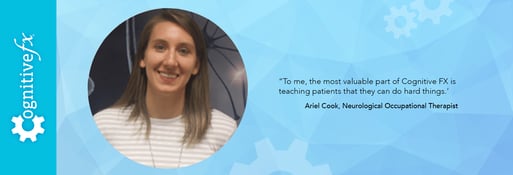Cognitive FX at the 2017 Your Health Expo
Cognitive FX is excited to announce that we will be at this year’s Your Health Expo on February 25 from 9 am to 6 pm at the South Towne Expo.
Published peer-reviewed research shows that Cognitive FX treatment leads to meaningful symptom reduction in post-concussion symptoms for 77% of study participants. Cognitive FX is the only PCS clinic with third-party validated treatment outcomes.
READ FULL STUDY
By Brittany Prijatel - Sports Psychological Consultant
Gratitude is a profound tool for cultivating positivity. Gratitude is simply the conscious act of bringing your attention to what you have or want to appreciate. More importantly, gratitude is a choice. By taking the time to appreciate the abundance that we have in our lives, we create a momentum towards receiving even more. When you begin to say thank you for the things that you have, and the kindness others share, you truly notice all the great things you have to be thankful for each day.
Gratitude also has shown to be an effective way to interrupt your thoughts. Simply put, if we notice we are in a bad mood affected by something negative, we can stop and start to list off the things that we are grateful for. This practice allows us to shift our perspective enabling us to find joy. As Brené Brown said, “There is no joy without gratitude.”
Being grateful is not about belittling or ignoring your emotions. Gratitude is a matter of focusing on what we DO like in our life and shifting our focus on what is working. When you can see a challenge as an opportunity, that is the first step in cultivating gratitude for a positive mindset despite your circumstances.
I like to keep a journal by my bedside and each night write down my three gratitude’s for the day. Additionally, I like to re-read them in the morning to charge my day with a spark of positivity. When we are focused on finding gratitude, it changes our perspective and can change our whole day because we are searching for things to be grateful for.
List out five things that happened to you, for you, and because of you. Sometimes this means I write down nice things others have done for me, or things I helped someone else with. It can be anything that happened that made my day better or brighter.
To practice gratitude throughout your day, set the alarm to 12:34 to take a moment to be grateful. When the alarm goes off say out loud 1, 2, 3, 4 I am grateful for… and find a few things to be grateful for at that moment.
Not everyone enjoys writing, but one unique way to practice gratitude is by taking pictures of things that you are grateful for or things that symbolize gratitude to you. This could include pictures of the sunrise or sunset, pictures of loved ones, friends, your dog, activities you are doing and enjoying and more. Once you have 50 pictures or so print them out to create a book to look at them or post them in a place, you will see them every day.
We challenge you to schedule a time each day for 30 days and do a 360° look at something that happened or is happening during your day. Find something random to be thankful for like lint on your jacket. We then want you to think what it means to have that random thing. Taking steps backward to understand just how much you have to be thankful for starting with that thing.
For example, Lint. Lint on my jacket means I own a jacket, and that my jacket is clean. If I have clean clothes, then I have a washer and dryer to clean them at home. If I can clean them at home, then that means I have a home, and I am safe at home!
Who knew a piece of lint could connect to feelings of safety and reassurance? Think of something, anything you see and follow it through connecting it to what that means you have in your life, look around you to get some ideas. Will you take the Cognitive FX challenge and find one random thing to be thankful for each day for 30 days? You can share your experiences on our Facebook page here.
Overall, gratitude can change your life bringing the positive to light to help you focus on the good that surrounds you each day. Cultivating gratitude takes practice, and as you practice daily, then gratitude can empower you to see and enjoy the good in your life.

The "Cognitive FX Team" is a collaborative ensemble of distinguished doctors, therapists, and practitioners. Our experts are pioneers in the field of neuroimaging and concussion treatment. With extensive experience and a strong commitment to patient care, our team excels in utilizing cutting-edge technologies, such as functional MRI (fMRI), to provide personalized diagnostic and treatment strategies. Our renowned professionals have published groundbreaking research, developed innovative neuroimaging biomarkers, and conducted thousands of individualized patient assessments. We take pride in our holistic approach to patient care, focusing on physical, cognitive, and emotional aspects of recovery. As leaders in the industry, the Cognitive FX Team is dedicated to advancing the science of concussion diagnosis and treatment to provide our patients with the highest level of care and support.

Cognitive FX is excited to announce that we will be at this year’s Your Health Expo on February 25 from 9 am to 6 pm at the South Towne Expo.

Booster Days are designed to help previous Cognitive FX patients obtain additional support after EPIC Treatment if needed.

Brady Tucker is a Research Associate here at Cognitive FX.


For Immediate Release – April 3, 2017, Provo, UT

The Brock String Test is designed to test and treat visual perception problems. This is important because these problems can contribute to headaches, blurry vision,...
Published peer-reviewed research shows that Cognitive FX treatment leads to meaningful symptom reduction in post-concussion symptoms for 77% of study participants. Cognitive FX is the only PCS clinic with third-party validated treatment outcomes.
READ FULL STUDY